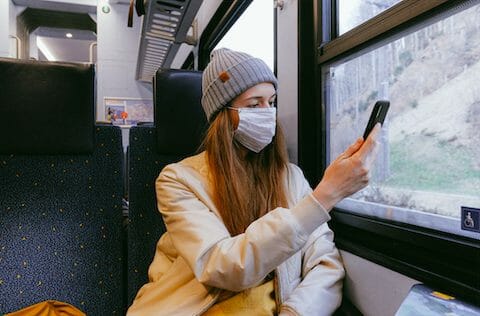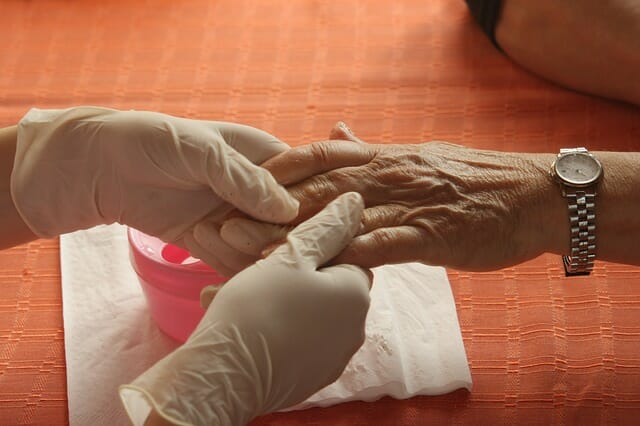As COVID-19 continues to spread and many people make plans to protect themselves and their loved ones, it’s also important to consider mental health during this time. Quarantine life can lead to increased anxiety and depression in many people, and particularly in people with dementia.
Being Patient spoke with Dr. Steven Sabat, neuropsychologist and Professor Emeritus of Psychology at Georgetown University, about how caregivers can manage increased anxiety and depression among their loved ones, as well as how to reframe the situation to manage their own mental health.
- Physical distance is not emotional distance; it’s important to keep in contact with one another.
- In preparation for the worst case scenario, it’s important that caregivers have plans in place.
Reframing Your View of the Crisis
Being Patient: How do you deal with a crisis like this that just pervades conversation?
Dr. Steven Sabat: First of all, it’s important to recognize the reality. And by that, I mean being mindful about what we can do to control things. These days, lots of people feel out of control, and for good reason. There’s this thing going around, and you don’t know where it is, and you can’t see it. When we feel out of control, the anxiety levels go up. And so it’s really important to focus on what we can do, rather than what we can’t do.
Focusing on what you can’t control is not a good idea because you can’t control it, but if you focus on what is possible to control, then you can have at least some feeling of safety and your anxiety levels can go down. Following all of the COVID-19 CDC recommendations is really important.
Another thing that’s really important is to stay away from constant exposure to the news. It’s not going to change from moment to moment or hour to hour, so it’s really important to keep the dose small. Hearing that twenty more people were diagnosed in Idaho today is not going to help. A lot of people become news junkies, and that just raises the level of anxiety.
So it’s really important to focus on taking control of the situation ourselves in all the ways we have available to us.
Should Your Loved Ones Be Kept Aware of the COVID-19 Crisis?
Being Patient: For caregivers of a loved one with dementia, is it worth explaining the situation to them multiple times if they don’t appear to hold onto the memory? Is it just causing unneeded stress?
Dr. Steven Sabat: In a way, I can see why people might come to that conclusion because the person might not recall having been told x, y, and z, and so every time they’re questioning what’s going on. And yes, in that sense it can be a shock to hear it over and over again.
But on the other hand, if there’s something that’s emotionally powerful, it’s really not a good idea to assume that a person diagnosed with dementia has made no memory whatsoever about what he or she has been told. We have this ability called implicit memory that can still function, in spite of the fact that a person might not recall what you have said to him or her ten minutes ago.
So one thing I would do is that if a person is saying, “Well what’s going on?” ask them to take a guess as to what they think is going on, and is it a good thing or a bad thing? And dollars to donuts, the person will say, “Well, I think it’s a bad thing.” Ask them how they feel about it, and then start to explore that so that the person can start talking about how that feels.
So I would not assume that a person has no recall because of a lack of memory at all, and now we have to go through this again and again. Although it might be important to remind a person that it really is a good idea to wash your hands and do all of those hygiene things.
Being Patient: Is there a better way to talk about this crisis and ease someone into it?
Dr. Steven Sabat: It may sound kind of odd, but stick to facts. The one who is conveying this information should do it without intensity and fear, but just say, “Ok, this is what’s going on, this is what we need to do, and this is how we need to do it. And if we do these things, the chances are that we’ll be better off than if we don’t.”
So as I said earlier, take break from watching the news, get sleep, organize the idea so that there are things that we can be doing that aren’t about the disease. It’s time to do things and get on with it because thinking about it and obsessing about it doesn’t really help.
So convey information in a factual way, and then say, “Now, let’s do this.” And when we do that, all of a sudden we’re not overwhelmed, we’re distracted, and we need to be distracted. The fact is, thinking about it doesn’t make it any better.
Staying in Contact and Making Plans
Being Patient: We’ve also heard from people with early stage dementia that this is a very hard time for them, particularly for those who are socially active, because they’re being forced to stay home often by themselves. What advice would you offer them?
Dr. Steven Sabat: I think a couple of things here are worth keeping in mind. One is that people in the early stages of diagnosis have a lot more cognitively intact, so that you might not necessarily need to remind them, they may not have the recall deficit that’s that severe.
But in any event yes, the anxiety will be higher if you’re alone, and so that means that we need to provide social supports for those people that can help them through this. I want to distinguish here between people who are living alone, people who are living with loved ones, and people who are living in assisted-living facilities and in nursing homes. So depending on the circumstances, the recommendations could be quite different.
People living alone, those people need to be contacted on a regular basis by friends and family. And if we make it a point of gathering people—friends, family, relatives—to phone those people who are living alone and then talk, spend some time, have a conversation, that can ease some of that feeling of loneliness. And it’s also important to recognize that physical distance is not the same thing as psychological distance.
There are people with whom you feel close who may live thousands of miles away from you. Maybe you don’t even speak to them except once in a blue moon, but you still feel close to them even if they’re a great distance away. So no matter how far away or far apart we are, when we make those contacts, that can do a great deal to ease the feeling of being alone, and that’s when empathy has to start kicking in.
Being Patient: What if you’re a caregiver and you get COVID-19? What should you do?
Dr. Steven Sabat: So rather than going in circles in your mind around and around worrying about what happens if I get sick, it’s better to think, “Okay, in case I get sick, let’s now put in place, to the best ability that I have, a plan.” So, we have to have lined up phone numbers of people who might be willing to help and all the numbers of physicians who might be able to tele-health.
Have a bag packed in case you need to go to the hospital so you don’t have to scurry around and look for something. But number one is having names and numbers of people who can fill in. Talk to your people and have things lined up. It’s a terrible thing to contemplate, but there are two choices. One choice is to do nothing. The other choice is to do something. The something you do may not be perfect, but it’s something, and at least you’re doing something to cover your bases.
And you never know. It could be COVID-19, but it could be strep throat, or you could have a fever and be unable to get out of bed. No matter what, you need to have a back-up plan for some coverage. That could be neighbors, it could be friends, something. Again, I don’t have the magic bullet answer this. But I do know that when we take action, we’re better off than when we don’t.




